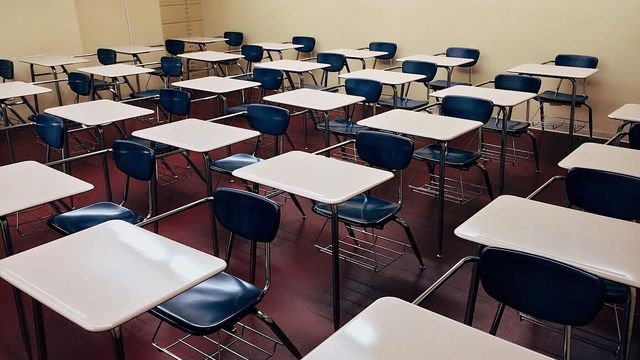NC Democrats' bill would fund $5.6 billion education equity plan
North Carolina lawmakers have filed a bill to implement the multibillion-dollar action plan to increase students' access to "sound basic" and "high quality" education.
Posted — UpdatedHouse Bill 946 calls for $5.6 billion in new spending through mid-2028, largely on efforts to increase funding for low-wealth school districts and for students with additional needs, such as those with disabilities.
That averages out to less than $800 million in new funding per year. State education spending totals about $9.75 billion annually.
The bill stems from state court orders that have found the state hasn’t and still doesn’t provide its constitutionally promised “sound basic education” for all.
That failure is all about the money, advocates of the bill say.
Problems families encounter at school often come down to schools not having sufficient resources, they said on a conference call with reporters Monday. Further, they noted, test scores and school performance correlate with income levels, which often correlate with how much counties can provide to the districts on their own.
The coronavirus pandemic has put even more stress on disadvantaged students and school districts, and inequities in what students have access to, such as broadband internet, have become more obvious, the bill’s proponents say.
“There is no greater time than now to do what is right for North Carolina’s children,” said Kellie Easton, executive director of Action 4 Equity.
But the bill doesn’t appear poised to pass.
It has only Democratic sponsors, and legislative Republicans have said they’re frustrated with not playing a bigger role in the formation of the action plan.
But Republicans are receptive to parts of the bill.
“While the appropriation of funds is the purview of the legislature rather than the courts, some of the policy suggestions in the report are worthy of consideration,” House Speaker Tim Moore said in a statement to WRAL News. “We certainly expect teacher pay and K-12 funding will continue on an upward trajectory as it has every year for the past 10 years.”
House Bill 946 translates the long-term Leandro case action plan into legislation. It was filed earlier this month and has sat in the House Rules committee since May 12, to the ire of the bill’s sponsors.
“We all know that Rules committee assignment doesn’t indicate promise for the bill,” said Rep. Julie von Haefen, D-Wake.
The bill could be discussed more robustly in the House K-12 Education or the House Appropriations committees, von Haefen said.
If members of the North Carolina General Assembly have felt left out of the process of deciding how the state can solve the problems outlined in the decades of Leandro rulings, “they can now have a voice,” she said.
“We can discuss it, we can debate it, we can amend it,” she said.
Republicans haven’t proposed their own bill addressing the Leandro case, Rep. Raymond E. Smith Jr., D-Wayne, said.
To Republicans, he would say, “If you truly wanted to have a voice in this, we would see legislation on the floor. We have seen nothing.”
Instead, Smith said Republicans have sponsored bills to shift more public money to private school vouchers and to limit schools’ abilities to discuss racism and sexism in the classroom.
The 37-page House Bill 946 reflects the long-term Leandro action plan filed by the North Carolina Department of Public Instruction and the North Carolina State Board of Education in state court in March.
The new spending outlined in that plan is largely for lower-wealth school districts; for students with disabilities and students learning English; for providing more support staff, such as counselors, nurses and psychologists; and for expanding pre-kindergarten and early childhood education across the state.
But one of the first big expenditures is a 5% raise for teachers, totaling $232 million next year.
The funding would largely come from state coffers, and Democrats and Republicans are in dispute over how much of that money to save and how much to spend and on what.
The long-term action plan notes federal stimulus funding for schools is helpful, but entirely separate, from the plan. On Monday, von Haefen said it could cover some expenses but the bulk of it, which she said is the state’s constitutional obligation.
North Carolina received $396.3 million in pandemic aid from the CARES Act last spring, $1.6 billion under a second aid package passed in December and will receive $3.6 billion under the most recent stimulus, the American Rescue Plan.
Judge Lee required the long-term action plan as a part of the drawn-out lawsuit known colloquially as the Leandro case, a reference to the original student plaintiff. The case dates back to when five low-wealth school districts sued the state in the 1990s, contending the state didn’t adequately fund them to provide quality education access and that they didn’t have the tax base to do it themselves.
The state Supreme Court later found in favor of the plaintiffs in 1997. In 2002, Superior Court Judge Howard Manning ruled the state had violated students’ rights to a “sound, basic education” and ordered the state to remedy that.
• Credits
Copyright 2024 by Capitol Broadcasting Company. All rights reserved. This material may not be published, broadcast, rewritten or redistributed.






